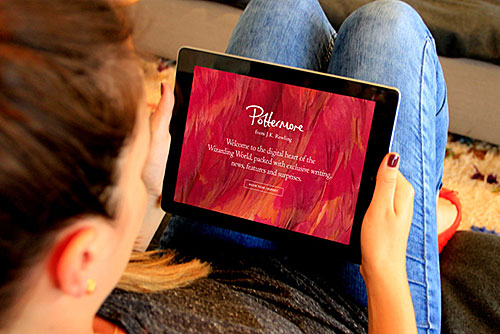Harry Potter is a name almost immediately recognizable today in 2016—whether your first thought is of a lightning scar, the Marauder’s Map, or the volume of fans across the world who have for years celebrated the cultural phenomenon that J. K. Rowling’s wizarding world became. On the first day alone, 8.3 million books were sold when Harry Potter and the Deathly Hallows was released on July 21, 2007. As consumers, we read, we wept, we watched the movies, we dressed up as characters, and we reluctantly celebrated the completion of such an influential story with the release of the last movie in 2011.
However, with the work of J. K. Rowling, the world of Harry Potter continues with Pottermore.
For those of you not in the know, Pottermore, “the digital publishing, e-commerce, entertainment and news company from J. K. Rowling, is the global digital publisher of Harry Potter and J. K. Rowling’s Wizarding World.” So while Bloomsbury is the physical publishing company smart enough and lucky enough to have published the Harry Potter series, J. K. Rowling retained the digital rights to Harry Potter and created the Pottermore company, which features sorting games for fans, news articles about wizarding events, new writing by J. K. Rowling, and, interestingly enough, “enhanced” ebooks only available on the Pottermore site.
While fans of the series can take quizzes, explore a book’s history, and enjoy various other features for free, the ebooks (and links to those ebooks) appear throughout the site as a reminder of what you can purchase on the website. In apps, this feature is called “freemium” and is used to encourage microtransactions, like buying more Pokeballs in Pokemon Go. On Pottermore, you are able to find out your house, your wand, your patronus, or Minerva McGonagall’s backstory, but you have to pay to see what has been enhanced in their new electronic edition of the book. Something to note about the enhanced editions: they are available exclusively on iBooks. If you don’t own any Apple products, you are out of luck.
It is interesting that Apple is the only platform on which readers can experience these enhanced editions. Both are giants in their respective fields, and both have incredible negotiating powers. The idea of exclusivity is a commodity in itself, and one that could inspire some of the many Harry Potter super fans to use iBooks for perhaps the first time. That mutually beneficial relationship is notable because Bloomsbury doesn’t appear to be involved. In fact, when you search Pottermore for any mention of Bloomsbury, nothing shows up.
As a new student in the world of publishing, the lack of involvement from the original publishing house stood out to me. J. K. Rowling’s story has gained momentum since 1997 and has become a multimedia empire that spans far beyond Bloomsbury. The acceleration of accessible technology coinciding with the huge popularity of Harry Potter allowed for the creation of a story that has expanded far beyond the traditional publishing house. Pottermore was created to be a digital publishing house exclusively for Rowling’s wizarding world, and its sheer existence demonstrates a subversion of the typical author-publisher relationship. As a fan of the magical world, I delight in Pottermore, but as a publishing student, I wonder what it means for the evolution of the publishing industry.

